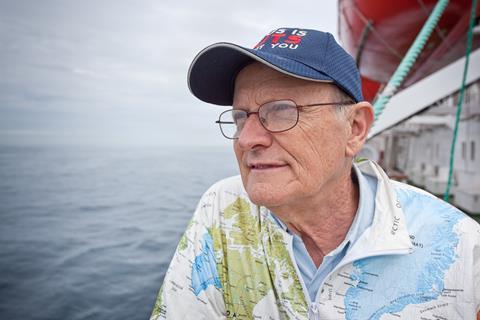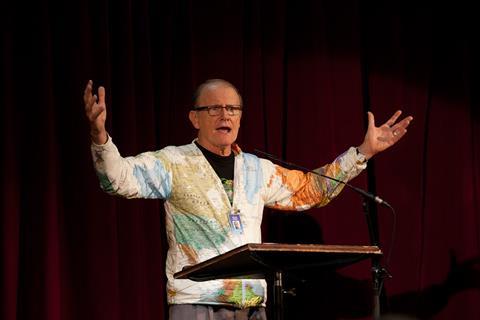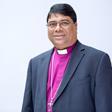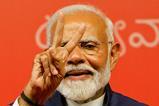The founder and former director of the global Christian mission agency, Operation Mobilisation died last night surrounded by his family at his home near London. He was 84. Bishop Joseph D’Souza remembers him

As the founder of Operation Mobilisation (OM), George Verwer was easily one of the most influential Christian leaders and evangelists of the last century. He served OM with distinction, and he inspired countless other Christian leaders all over the world.
His leadership was marked by what I only know how to call: a spirit-led gut instinct. Whatever the complex, global issue that confronted him, he always dared to act, and his actions were almost always right.
His humility also displayed his strength. He never hid his flaws. George was fallible, and he made sure everyone knew it. This is why his sermons, books, and generous conversations over tea were always seasoned with wisdom and blessed with knowledge.
George was young when he founded the work. It initially began as a literature distribution work known as Send The Light (STL). George’s great passion for disseminating God’s word through literature and other media never diminished throughout his life.
In his twenties, during the late 1950s and 60s, he responded to cultural upheaval in North America and Europe by offering a radical faith in Jesus Christ to young people searching desperately for meaning in their lives. His Christian message was filled with grace and full of radical discipleship.
His message resonated with a whole generation of young Christians who followed him in reaching the world for Christ, whatever the risk and whatever the cost. Those disciples also learned to overcome their fears, flaws, and failures.
As much as any Christian in history, George Verwer led his generation, and the generations around it, to “reach the world in their own generation.”
While the Western Church’s enthusiasm for sending out missionaries was declining, George pioneered a significant, global short-term missions movement. The older missions organisations were sceptical of George’s approach but could not stop the wave of short-term missionaries who answered the Lord’s call through George’s vision. Those short-termers became their long term recruits.
George paid attention to where the winds of the Spirit were blowing, and as a maturing Church emerged in the global south, he put his efforts into helping the Church become sustainable. George was one of the first white missions leaders to fully empower nationals to lead the efforts he initiated in the majority world. George was not only incapable of racism; he never treated anyone different than him as less than him.
Along the way, he trained, inspired, and knew – from the north, south, east, and west – the majority of the most influential Christian leaders reaching the global south with the gospel. In many cases, their lifelong ministries were initiated at the personal invitation of George to join him on a short trip to reach some part of the world with the good news. He personally touched the lives of more than 100,000 mission leaders, impacting countless tens of millions of lives.
OM’s work in India would eventually become the organisation’s most significant work globally, both in personnel and scope. India was very big on the heart of George.

From the very beginning, George’s spirit-led gut instincts helped him to construct the Indian work in a different way than what was done in the West. From the very inception, the leadership was handed over to the Indians, and from the beginning, he gave complete freedom to develop the policies, strategies and missiology at the local level. There was no “international” mandate or control.
When the work in India developed into a fully-fledged church movement, he supported it without reservation. George told me many times that the complete autonomy of the Indian work did not happen the way we would have imagined it. Still, it was only proper for the Indians to forge their future in a complex nation in partnership with OM and non-OM groups around the world. All that mattered to George was that the Church was focused on Jesus and that the local community was responsible for it and not organisational tags.
Almost as quickly as he learned any lesson, George wrote a book about it and then sent it to leaders worldwide. One of those books, written as a young man, was entitled Revolution of Love. In it, he crafted early ideas which would prove seminal in the history of the global Church across the 20th and 21st centuries. Before OM fully embraced the need for a holistic approach to mission, George wrote that if we did not practice love in action for the poor, we could not claim we loved the world as God loved the world. He taught passionately that our Christian life and testimony would ring hollow without love for one another in the Church.
Those words were prophetic for the context of a bitterly divided Christian world today! The fact that Jesus said the world would know we were his disciples when we loved each other (John 13:35) is lost among just too many Christians in this age of hate-filled social media posts.
George supported individual churches in developing their particular emphasis on thought and practice. He opposed Christians becoming adamant and dogmatic about their interpretation or practices. He didn’t want any limits placed on a church’s ability to work with other Christians in the mission of reaching the world.
George believed that many of the world’s significant issues could not be addressed by one organisation or church. When it comes to social care, hunger, injustice, discrimination, poverty, and sharing the good news of the kingdom of God, the world needed the loving and united effort of the global Church in all its diversity. George’s ability to relate to leaders across the denominational spectrum was as phenomenal as it was groundbreaking.
In his later years, an older and wiser George Verwer began to speak at every opportunity about how and why God works in and through a Church filled with human mistakes and sin. Out of his vast experience with imperfect and broken leaders and their churches came two books - Messiology and Confessions of a Toxic Perfectionist.
The message of these books is also his legacy in a world where younger and older Christians are confronted by the fall of prominent Christian leaders and the mess it leaves all around. George always saw God’s grace and second chances, especially in our biggest messes. He was quick to repent and never without a personal word about his inadequacy.
Losing George is losing my life’s mentor and my closest personal friend in the ministry. It is also an inspiration of a life lived well and a legacy now made complete with the words we all long to hear, “Well done, Good and faithful servant.”
I can’t wait to see him again in the kingdom. In the meantime, with God’s help, let’s commit to living our lives more like he lived his own.





































No comments yet